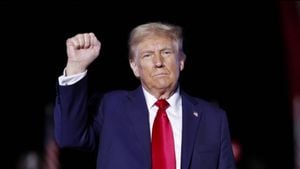Chancellor Rachel Reeves recently stirred the pot with her decision to hike national insurance contributions (NICs) for employers, which has sent shockwaves through the UK economy. According to Deutsche Bank's research, this tax increase could potentially devastate the job market, with projections indicating the loss of more than 100,000 positions by early next year. The hike, part of Reeves' budget strategy, raised employer NICs by 1.2% and decreased the wage threshold where employers start paying the tax from £9,100 to £5,000.
"Higher employer NICs could put additional strain on the labour market by around the turn of the year," stated Sanjay Raja, the bank’s chief UK economist. He emphasized the risks, warning of declines in hiring and employment growth, as companies might resort to cutting existing payrolls or adjusting hiring plans to cope with the additional financial pressure.
While the government maintained it wasn't directly raising taxes on working individuals, many business leaders, particularly within retail and hospitality sectors, signaled looming price increases or inevitable job reductions. Andrew Higginson, chair of the British Retail Consortium, recently voiced grave worries over the tax burden. He declared, "A jump in costs would be too much for the retail industry to bear." Similarly, experts at Peel Hunt predicted retail firms might see pre-tax profits drop by approximately 7.5% due to this national insurance overhaul.
This isn't purely a concern for the corporate sector. MPs across various London constituencies voiced their frustrations about the budget hitting not just businesses but also the charitable sector. During debates, Munira Wilson, the Liberal Democrat MP for Twickenham, brought attention to the potential repercussions for hospices and charities, which are already facing funding uncertainties.
"Shooting Star children’s hospice, serving families across south-west London, has expressed concerns over the sustainability of its operations amid these changes," Wilson highlighted, urging the government to exempt hospices from the NIC rise.
Health Minister Karin Smyth acknowledged the pressures facing the healthcare sector but assured MPs the government was re-evaluated allocation strategies to accommodate these adjustments. Despite reassurances, Sir Roger Gale, another MP, criticized the existing plans and called for immediate support to help GPs and hospices manage the impact of the NIC increase.
On the flip side, some businesses are attempting to navigate the treacherous waters of the new financial reality without passing costs onto consumers. WH Smith’s CEO, Carl Cowling, explained the retailer anticipated £7 million worth of additional expenses due to the budgetary changes but remained committed to avoiding price hikes. He noted, "It’s manageable… Quite a lot of our business is outside the UK." This approach contrasts sharply with other retailers who have expressed the likelihood of raising prices to cope effectively.
For WH Smith, which reported solid growth with global profits rising 16%, the added costs from national insurance come on the heels of anticipated wage increases tied to the minimum wage rise also set out in the budget. Cowling hopes to explore cost-saving measures rather than writing hefty price tags on consumer goods.
Where does this leave the UK job market amid uncertainties? Experts predict the results won't be immediate but rather gradual as companies adjust their employment strategies. Raja from Deutsche Bank put it succinctly: "The employment market is entering somewhat of a precarious phase. Job losses will likely be the last resort for many businesses, but there’s no avoiding the tough choices looming on the horizon."
The latest numbers show uncertainty hanging heavily over the economy as gross domestic product (GDP) figures demonstrated stagnation, with the economy contracting by 0.1 percent just last month. The National Insurance rise has amplified fears about bringing growth back on track—a prospect MPs believe jeopardizes the economic revival Reeves’ government aims to achieve.
Onlookers await to see how the situation develops, with many scratching their heads over the balance of funding needed to bolster public services without jeopardizing employment. Will the job losses be worth the price tag of public funding, and can the charitable sector sustain its worthy endeavors amid the financial strain? Only time will tell as the backward glance at Reeves’ budget might soon reveal cracks the government will need to bandage.



